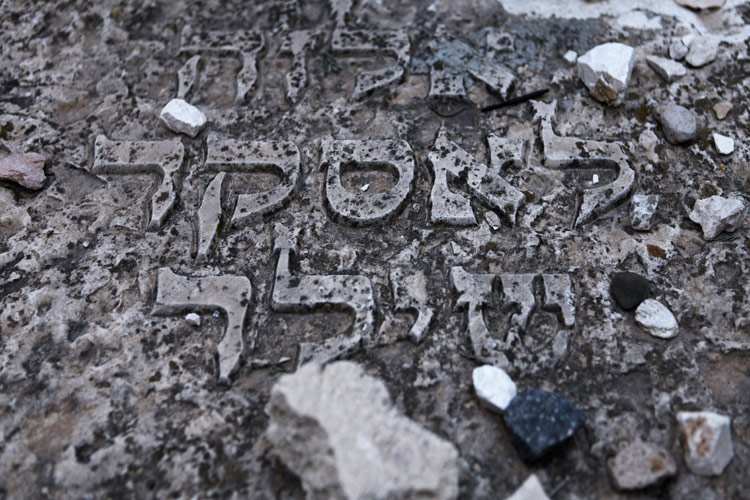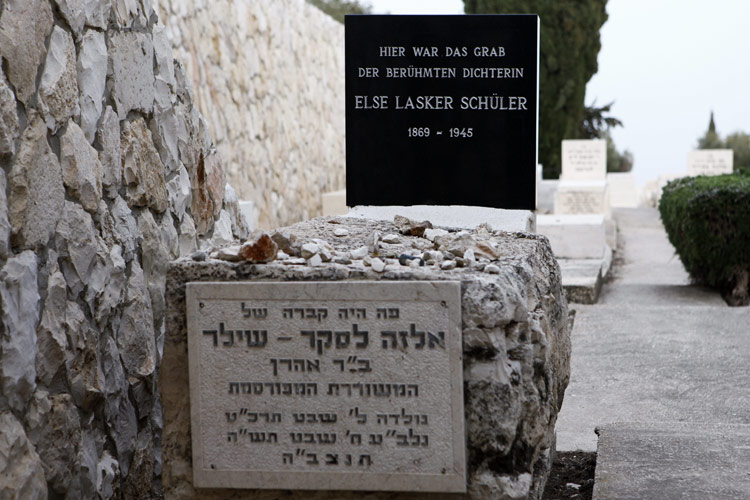Israel:Else Lasker-Schüler‘s grave in Jerusalem: Unterschied zwischen den Versionen
(Die Seite wurde neu angelegt: „© Goethe-Institut Else Lasker-Schüler is buried at the foot of the Mount of Olives. When she was …“) |
|||
| Zeile 13: | Zeile 13: | ||
The traces that she has left behind in Jerusalem – apart from her poetry – are discreet, or have disappeared. In the district of Nayot by her grave there is a little road called Else Street that is named after her. In Jerusalem’s Yad Kennedy Park, a 3.5 m high bronze sculpture was also erected as a tribute to her in 1995: a slim tree trunk with wings. This “Angel for Jerusalem” is the work of Düsseldorf artist Horst Meister. But his sculpture disappeared in July 2007. It is assumed that metal thieves got their hands on it.{{#newBox:listbox}} | The traces that she has left behind in Jerusalem – apart from her poetry – are discreet, or have disappeared. In the district of Nayot by her grave there is a little road called Else Street that is named after her. In Jerusalem’s Yad Kennedy Park, a 3.5 m high bronze sculpture was also erected as a tribute to her in 1995: a slim tree trunk with wings. This “Angel for Jerusalem” is the work of Düsseldorf artist Horst Meister. But his sculpture disappeared in July 2007. It is assumed that metal thieves got their hands on it.{{#newBox:listbox}} | ||
==Related links== | ==Related links== | ||
| − | * [http://en.wikipedia.org/wiki/Else_Lasker-Sch%C3%BCler Else Lasker-Schüler (en.wikipedia.org)]{{#newBox:listbox}} | + | * [http://en.wikipedia.org/wiki/Else_Lasker-Sch%C3%BCler Else Lasker-Schüler (en.wikipedia.org)] |
| + | * [http://forward.com/articles/135279/absorbing-art-of-an-expressionist-poet/ “Absorbing Art of an Expressionist Poet” – Else Lasker-Schüler’s Surviving Drawings and Paintings Are Displayed in Berlin (forward.com)]{{#newBox:listbox}} | ||
== German Traces in Israel == | == German Traces in Israel == | ||
A project by the [http://www.goethe.de/ins/il/lp/deindex.htm Goethe-Institut Israel] | A project by the [http://www.goethe.de/ins/il/lp/deindex.htm Goethe-Institut Israel] | ||
Version vom 15. November 2012, 10:18 Uhr
Else Lasker-Schüler is buried at the foot of the Mount of Olives. When she was laid to rest here in January 1945, Rabbi Kurt Wilhelm recited a poem from her last poetry anthology “Mein blaues Klavier” (My Blue Piano). “Ich weiß, daß ich bald sterben muß/ Es leuchten doch alle Bäume/ Nach langersehntem Julikuß” (I know that I must die soon/ The trees are shining after all/ After the long-desired kiss of July).
In the final year leading up to her death the poet – maybe the most significant female German poet – lived in poverty in Jerusalem. It was anything but a happy existence. Admittedly the Promised Land always inspired her creative powers – she poetically dubbed Palestine the “Star of the Bible” – but for her Jerusalem ended up being a final – involuntary – home after all.
Emigration 1933
After being assaulted in the street in Germany, Else Lasker-Schüler emigrated to Zurich back in April 1933. From there she made three journeys to Palestine – her “Hebrew Land”. In Autumn 1938 she was officially expatriated from the German Empire. What she had originally planned in 1939 as a three-month stay finally ended in permanent exile. The outbreak of war prevented her returning to Europe, but above all the Swiss authorities refused to issue her a return visa. In 1944 the poet became seriously ill. After a heart attack on 16th January, Else Lasker-Schüler died on 22nd January 1945 in the Hadassah Hospital.
Angel for Jerusalem
The traces that she has left behind in Jerusalem – apart from her poetry – are discreet, or have disappeared. In the district of Nayot by her grave there is a little road called Else Street that is named after her. In Jerusalem’s Yad Kennedy Park, a 3.5 m high bronze sculpture was also erected as a tribute to her in 1995: a slim tree trunk with wings. This “Angel for Jerusalem” is the work of Düsseldorf artist Horst Meister. But his sculpture disappeared in July 2007. It is assumed that metal thieves got their hands on it.German Traces in Israel
A project by the Goethe-Institut Israel
Author: Gisela Dachs
Photos: Noa Ben-Shalom

